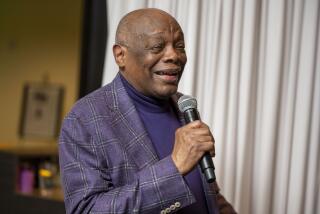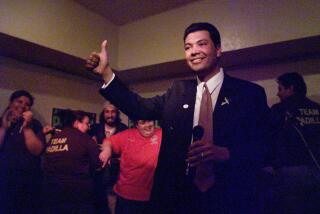White Keeps Wilson Machine Running
- Share via
SACRAMENTO — When Pete Wilson becomes governor next month, he will bring with him one of his closest friends--the man he has always trusted to tell him when he is wrong.
He is Bob White: loyal adviser, political strategist, keeper of the gate and hatchet man. To some, he is Wilson’s alter ego. Without question, he is the man Wilson relies on to make things work.
“He is politically very adept and sensitive,” Wilson says. “He is not a yes man. I have great personal affection for him. We have a very good, I would gather unusual, relationship.”
Beginning 22 years ago, the two Republicans formed the partnership of Wilson & White, a lasting alliance between the reserved politician and his excitable top aide.
In the new Administration, White will be chief of staff--a position of extraordinary influence. With the authority that comes from knowing his boss’ mind, White will preside over the governor’s staff, oversee the day-to-day operations of the state and decide who gets in to see the governor.
More than ever, White’s skills as a manager and political strategist will be tested as he becomes a central figure in the new Administration’s dealings with the Democratic-controlled Legislature.
Wilson and White pledge that the new governor will be open to hearing a wide range of views. “For many years I have given him a very clear instruction,” Wilson said. “Don’t let me become insulated or isolated. I think it is a thing from which chief executives suffer.”
White said: “It’s a very forthright relationship. He’s pretty open to permit you to be real candid where you disagree and where you agree. Over the years, we have grown to understand where both of us are coming from.”
Although Wilson and White think alike on most issues, the publicity-shy White has a style that is unmistakably his own. While Wilson is deliberate and somewhat formal, White is animated, outspoken and at times overbearing. With a fast-paced walk and a short attention span, White seems always to be in a hurry. Yet he talks easily with all manner of people, spars good-naturedly with his adversaries and lays claim to a vast number of friends from San Diego to Washington.
“He is a character,” Wilson says, “He has a marvelous sense of humor and doesn’t take himself too seriously.”
Above all, White is loyal to Wilson.
As the chief of staff first for Assemblyman Wilson, then for San Diego Mayor Wilson and finally for U.S. Sen. Wilson, White has become known as a hard-nosed administrator who always tries to protect his boss.
“He’s the guy who says no,” said Mike Madigan, a Wilson aide in San Diego who is now a senior vice president of Pardee Construction Co. “Even Bob White would like to be liked by everybody, but that’s not possible in the job he’s got, and he’s not flinched from being the bad guy when that’s required.”
At times, he also has earned a reputation as a bully who intimidates staff members, opponents--and even Wilson’s allies.
In San Diego, White once dressed down a city councilman for daring to call an emergency meeting of the council to deal with rising floodwaters while Wilson was out of town. The councilman officially was deputy mayor. But at City Hall, White’s word was law and the emergency session was canceled.
“Bob plays the role of the heavy,” said former Senate aide Mark Albrecht. “To the extent there is an image of Bob that is less than flattering, he is a guy who knocks heads hard. But I think that really comes from his strong desire to protect Pete, put him in the best light and take those hits for him.”
Yet, over the last two decades, White also has been the one who has pulled together a closely knit cadre of campaign workers that has been the key to Wilson’s electoral success.
“There’s no question that he’s tough, but you get a sense from him that he cares about you as a human being,” said George Gorton, who has worked in Wilson’s races since 1971 and was manager of the successful gubernatorial campaign. “I don’t mind if from time to time he has been explicit in telling me where I made a mistake.”
Now 48, his hair thinning and turning gray, White has spent nearly half his life as Wilson’s closest aide. He wears expensive suits, suspenders and a flashy gold watch. A bachelor, White says he is too “selfish” and consumed with work to marry.
A moderate Republican like his boss, White is a pragmatist who seldom displays his ideology. His primary role is to keep the Wilson machine running smoothly. But aides say that White gets deeply involved in key policy decisions and has a shrewd political mind.
“Pete knows the issues backwards and forwards,” said San Diego Mayor Maureen O’Connor who knew both men well when she served as a City Council member. “They’re both politically savvy, but I think White has a better idea of how, and if, it’s going to sell.”
Robert Stanley White was born in San Diego and grew up in the nearby communities of Lemon Grove and La Mesa. His father, Robert W. White, worked as a general contractor while his mother, Virginia, stayed at home with Bob and his younger brother, Jim.
Even as a high school student, the young Bob White had a tremendous interest in politics. He was president of his sophomore, junior and senior classes.
White’s mother recalls that in 1960, the year he graduated from high school, he insisted on attending a major political convention. Finally, she agreed to drive him to Los Angeles to the Democratic convention where John F. Kennedy was nominated for the presidency.
White attended San Diego State College, majoring in political science and journalism. He was elected to the student council, was editor of the yearbook and joined the Sigma Chi fraternity, where he made friends and political connections that have lasted all his life.
White’s first job out of college--and his biggest job outside of politics--was as national assistant director of Sigma Chi, traveling as a representative of the fraternity to campuses around the country.
He missed serving in Vietnam because he enlisted in the Coast Guard Reserves, spending six months on active duty.
In 1964, he worked as a volunteer in the presidential campaign of Republican Barry Goldwater. By 1968, the 26-year-old White was employed by the Republican Party as a field representative and was assigned to Wilson’s Assembly reelection campaign.
After the election, White was trying to decide whether to go to law school or become a priest when Wilson talked him into taking a job as his adminstrative assistant.
“OK, here’s the deal,” White recalls Wilson saying. “No more than two years. It wouldn’t be in your interest to go more than two years.”
As the chief of staff to a junior assemblyman, White’s cubicle in Wilson’s office was barely big enough for a small desk and an extra chair for visitors. But his lack of stature in the Capitol did not prevent him from getting to know everyone around him--including some key players.
Wilson recalls one day coming back to the office and finding Senate President Pro Tem Hugh Burns, a big burly Democrat, deep in conversation with White.
“Here was Huey seated in the one (visitor’s) chair with his knees jammed up against Bob’s desk,” Wilson said. “I thought it was strange that here was the most powerful man in the Senate sitting in Bob’s office.”
During the 11 years Wilson served as mayor, White helped run the city and hold together a shifting majority on the San Diego City Council. His temper tantrums were frequent enough to earn him the nickname “White Tornado.”
More recently Wilson said: “He is not a cruel person. He does not enjoy giving pain. On the other hand, if the person deserves pain he doesn’t shrink from administering it.”
Mayor O’Connor, then a young Democratic city councilwoman, saw another, more private Bob White--the one who made friends with the late-night janitors and brought them Christmas presents.
O’Connor, who became good friends with White, recalled how the two sometimes went out into the city anonymously to get a feel for its problems. “Bob is the type of person who will go to San Francisco and pop into an AIDS clinic and see what’s going on,” she said.
She also credited White with the ability to change Wilson’s mind on major issues, such as overcoming his initial resistance to building the San Diego Trolley line from downtown to Tijuana.
The contrasting styles of Wilson and his top aide are illustrated by their approach to learning Spanish when they were at City Hall. In a private class together, White enjoyed the challenge of speaking the language, freely making mistakes. Wilson, White recalled, would meticulously conjugate his verbs and ask the teacher, “Is that a Greek or Latin derivation?”
White’s heavy-handed image improved when he moved with Wilson in 1983 to Washington. Instead of dealing with the problems of running a city, his primary responsibility was directing Wilson’s Senate staff.
But Dixon Arnett, a former Republican assemblyman from Redwood City who served as Wilson’s legislative director, said loyalty to Wilson was so important to White that he sometimes perceived staff failures as a sign of infidelity.
While White has stayed on the public payroll since Wilson’s 1970 Assembly campaign, he has had a strong role in Wilson’s political operations, selecting his campaign staff and overseeing their operations from a distance.
Now, his role as chief of staff will change once again in Sacramento, where he will help Wilson cope with running the state’s vast bureaucracy and dealing with the independent-minded Legislature.
For White, the job is precisely what he has been preparing for ever since he was a young legislative staff member more than two decades ago.
“It’s something,” he said, “I clearly always wanted to do.”
Richard C. Paddock reported from Sacramento and Paul Houston from Washington.
More to Read
Get the L.A. Times Politics newsletter
Deeply reported insights into legislation, politics and policy from Sacramento, Washington and beyond. In your inbox twice per week.
You may occasionally receive promotional content from the Los Angeles Times.










